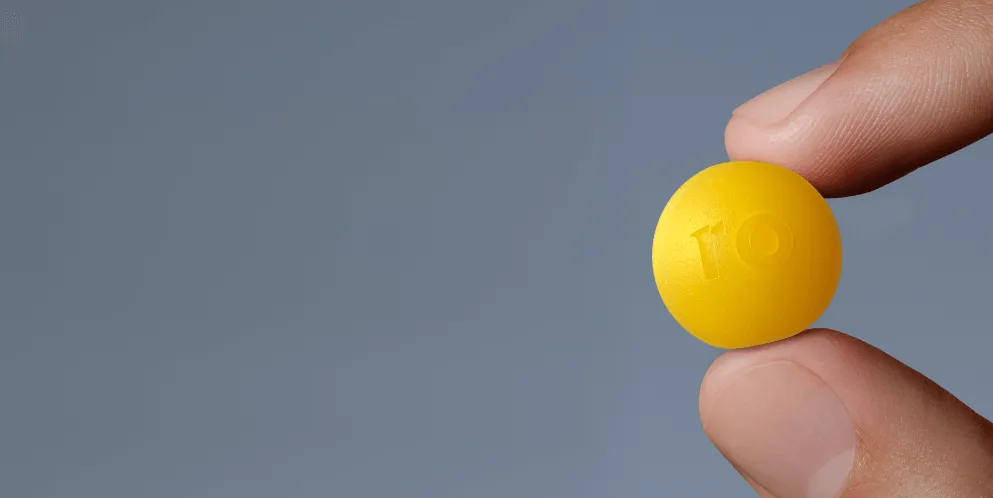Key takeaways
Turmeric is a popular spice that has long been thought to have medicinal properties.
Turmeric’s active compound curcumin has been shown to have various health benefits.
Curcumin has not been shown to directly help erectile dysfunction (ED). However, the health benefits of curcumin could theoretically benefit ED over time — indirectly, at least.
There are other research-backed ways to improve erectile dysfunction, ranging from lifestyle changes to prescription medications.
Curcumin can interact with certain medications and may be risky for some people to take. Always consult with a healthcare professional before taking a new supplement.
Here's what we'll cover
Here's what we'll cover
Here's what we'll cover
Key takeaways
Turmeric is a popular spice that has long been thought to have medicinal properties.
Turmeric’s active compound curcumin has been shown to have various health benefits.
Curcumin has not been shown to directly help erectile dysfunction (ED). However, the health benefits of curcumin could theoretically benefit ED over time — indirectly, at least.
There are other research-backed ways to improve erectile dysfunction, ranging from lifestyle changes to prescription medications.
Curcumin can interact with certain medications and may be risky for some people to take. Always consult with a healthcare professional before taking a new supplement.
Finding it hard to stay hard? If you’re dealing with erectile dysfunction (ED), you might be on the hunt for natural and prescription remedies that can help you keep it up. One remedy that’s gained attention is turmeric, which raises the question: Is turmeric good for erectile dysfunction?
Curcuma longa (AKA turmeric) is a plant native to Asia that's long been used for culinary, medicinal, and even cosmetic purposes. Curcumin is the main active component in the plant, which is also where turmeric’s famous vibrant yellow-orange color derives from. This doesn’t come from the plant’s leaves, but rather from its rhizomes, which are underground horizontal stems.
The medicinal use of turmeric dates back 4,000 years. Scientists now know that the curcumin found in turmeric is what’s responsible for the majority of the plant’s long-reported health benefits, such as antioxidant and anti-inflammatory effects. Researchers continue to study the plant’s uses in modern medicine today.
But, does turmeric help sexually? Can this spice help keep things hot in the bedroom if you’re having erection trouble? The short answer is probably not, but read on to learn more about turmeric for ED.
Is turmeric good for erectile dysfunction (ED)?
Turmeric might be able to indirectly help erectile dysfunction by improving overall health over longer periods of time in combination with a healthy diet and lifestyle. However, we don’t have any hard and fast scientific research that shows the effectiveness of turmeric for ED.
Some studies suggest curcumin’s anti-inflammatory and antioxidant effects may help address some underlying causes of ED, but we don’t have the necessary human studies to prove that turmeric alone can treat or cure ED. The only direct research on turmeric and ED was done on animals — and let’s just say that research about mice penises doesn’t necessarily directly translate to human penises.
So if you’re asking, “Does turmeric help with erectile dysfunction?” — the short answer is, not directly, at least based on the scientific literature we have right now.
How much turmeric should you take for erectile dysfunction?
Sprinkling turmeric into your diet, even in relatively large amounts, likely isn’t enough to reap significant health benefits, which is why many people opt for turmeric supplements that are high in curcumin.
If you decide you want to take a turmeric or curcumin supplement, research shows up to 8,000 mg per day of curcumin has been tolerated in the short term. However, commercially available turmeric and curcumin supplements typically range from 500 mg to 2,000 mg per dose. Since there is no research specifically backing turmeric for erectile dysfunction, there are no official guidelines for how much you should take to experience sexual benefits.
Regardless of your motive for taking turmeric supplements, check with your healthcare provider. They can provide guidance on what dose might be safe for you, since everyone’s body is different.
Turmeric benefits sexually
There are some potential health benefits of turmeric, but does turmeric help sexually? Some of curcumin’s general health benefits could translate to sexual benefits, including:
May reduce inflammation: Chronic, low-grade inflammation is a risk factor for erectile dysfunction. Research suggests that curcumin supplementation can help reduce inflammation over time. If inflammation is playing a role in your ED, curcumin could potentially help.
May reduce oxidative stress: Oxidative stress is another risk factor for erectile dysfunction. Curcumin acts as an antioxidant that can neutralize free radicals and combat oxidative stress to protect against cell damage.
May improve blood flow: Good blood flow is key for harder erections. Researchers have found that curcumin may help improve endothelial function, which is linked to the health of your blood vessels. It can also boost the availability of nitric oxide, which helps improve blood flow, too.
Could boost testosterone levels: Low testosterone may contribute to erectile dysfunction, and it can result in a lower sex drive, too. While there are no direct studies in humans, some animal studies have investigated the impact of turmeric on testosterone. One study on hypertensive rats, for example, found that turmeric and ginger could increase their testosterone levels. However, it’s unclear whether this would translate to humans (with or without high blood pressure), and more evidence is needed for improved understanding.
May improve sperm motility: A couple of small lab-based studies suggest that curcumin, one of the main compounds in turmeric, might support sperm motility, or the sperm’s ability to swim, in some individuals. While this doesn’t directly impact erectile function, it could benefit fertility. However, these studies were “in vitro,” meaning they were conducted in a lab setting outside of the human body, so the results may not reflect how turmeric actually affects sperm motility in real-world conditions.
What happens if you take too much turmeric?
If you take too much turmeric, you may experience some unpleasant side effects, most commonly related to the digestive system.
When consuming turmeric in food, you won’t be taking in very high amounts of it (yes, even if you’re heaping it into recipes!). Taking too much usually only happens with turmeric supplements, which contain curcumin in much higher concentrations. Additionally, some formulations are designed for increased bioavailability, meaning your body can absorb even more of the compound than it usually would. For example, some turmeric supplements also contain piperine — a compound found in black pepper — which can greatly improve curcumin’s bioavailability. In rare cases, prolonged use of high-dose, highly bioavailable curcumin has been associated with liver injury.
Remember: While turmeric is generally safe in moderation and when taken from reputable sources, there’s no scientifically-proven added benefit to taking more than recommended. This is especially true for benefits unproven by research, such as sexual benefits. Follow dosage guidelines on the supplement bottle and check with your healthcare provider before starting a high-dose turmeric supplement (or any other new supplement, for that matter). You can also ask your provider for advice on whether you should opt for a high bioavailability supplement formulation or not.
Turmeric side effects
You might not experience any side effects from turmeric, but some people experience gastrointestinal upset from taking too much, such as:
Diarrhea
Nausea
Vomiting
Acid reflux
Constipation
Turmeric interactions
Certain medications don’t mix well with turmeric, including (but not limited to):
Anticoagulants and antiplatelets: If you take anticoagulants (blood thinners) such as Warfarin or any antiplatelet medications, it’s best to avoid taking turmeric or curcumin supplements, since it can increase the risk of bleeding.
Chemotherapy: Curcumin may interact with chemotherapy treatments for cancer, making treatment less effective.
Medications that lower blood sugar: If you have diabetes and are taking medications to lower your blood sugar, it’s best to avoid curcumin since it might also lower your blood sugar, risking hypoglycemia.
Always consult a healthcare provider to determine if a supplement is safe to take with your existing medications and any other supplements you take.
Who should avoid taking turmeric?
Turmeric supplements from reputable sources should be safe for most people when taken within recommended doses. However, some people should avoid taking them. You should always check with a healthcare professional, but here are a few instances where turmeric supplements may not be right for you:
If you have liver disease: Due to the potential risk of liver injury from high doses of turmeric, it’s best to avoid turmeric supplements if you already struggle with liver disease, like hepatitis or cirrhosis.
If you’re iron deficient/anemic: Based on animal studies in mice, curcumin might further impact your body’s iron, so it’s best to avoid it.
If you have an increased risk of bleeding: As mentioned above, curcumin has mild antiplatelet effects which can increase bleeding risk in some people. Those with increased risk of bleeding including people taking medications like aspirin, warfarin, clopidogrel, rivaroxaban, and apixaban should discuss with their healthcare provider before adding this supplement into their routine.
In general, if you have any pre-existing health conditions, check with a healthcare provider before taking any supplements, since they could potentially affect your condition.
Alternatives to turmeric for ED
Looking for more scientifically-backed options to help with your erection troubles? You can try the following lifestyle changes and medications.
Eat a healthy diet and exercise regularly
Obesity is a known risk factor for erectile dysfunction, with research suggesting that people with a high BMI have up to a three times higher risk of ED than those at a healthy weight. Studies show that weight loss can improve erectile function, and eating a healthy diet and exercising regularly can help you achieve a calorie deficit and lose weight.
But exercise is good for erectile function, even without obesity in the mix, for many reasons, including improved blood flow throughout the body, reduced cardiovascular risk factors such as blood pressure and cholesterol levels, and even positive impacts on overall mood.
Take care of your mental health
Stress, anxiety, and depression can all contribute to sexual function, including your ability to get and maintain an erection. If you frequently struggle with mental health symptoms, they could be contributing to your ED. Another clue that psychological factors are playing a role in your ED is if you are still getting normal nighttime and morning erections but struggle with erections when it comes time for intercourse. Working with a mental health professional, like a therapist or psychiatrist, can help you manage your symptoms.
If your mental health struggles are more specific to your sexual function (like performance anxiety), a sex therapist can help.
Consider prescription medications
Medications known as PDE5 inhibitors (phosphodiesterase type-5 inhibitors) are approved by the United States Food and Drug Administration (FDA) to treat ED. These meds are often first-line treatments that help relax your blood vessels and increase blood flow to your penis when aroused. Common PDE5 inhibitors include:
Stendra (avanafil)
Other options include Ro Sparks (under-the-tongue dissolving pills that contain both sildenafil and tadalafil) and Ro’s Daily Rise Gummies (once-daily gummies containing tadalafil). While these last two options are not specifically FDA-approved for the treatment of ED, their active ingredients have been individually FDA approved for the treatment of ED.
Speak with your healthcare provider to see if these medications might be right for you.
Try injections
Erectile dysfunction injections are an additional prescription option when traditional oral ED meds aren’t the best fit. Medications in the injections include prostaglandin E1, papaverine, and phentolamine. These injections (yes, directly into the penis) dilate the blood vessels, allowing for better blood flow so you can get hard and stay hard. Once a healthcare provider prescribes them to you, you can administer the injections yourself at home.
Give penis pumps a try
While most people think of penis pumps as a tool to make your penis bigger (sorry, but they won’t have any permanent effects), they actually can help with getting an erection. A good ole’ fashion penis pump (formally known as a vacuum erection device) temporarily increases blood flow to the penis, and a recent meta-analysis found that using one can help improve “intercourse success rate” (i.e., getting hard enough to have penetrative vaginal sex) for those with erectile dysfunction that doesn’t respond to oral medications like Viagra.
Bottom line
So, does turmeric help with erectile dysfunction? We don’t have enough evidence to say yes. While curcumin supplements may improve aspects of your overall health, which might in turn lead to sexual benefits over time, we can’t say for sure that turmeric can help treat ED.
We don’t have solid research: Scientists haven’t specifically studied whether or not turmeric can help erectile dysfunction in humans. While we do have evidence that turmeric can result in general health benefits, claims that turmeric can benefit you sexually are theoretical. Plus, we don’t know what dosage of turmeric or curcumin would even result in said benefits for ED. Given the way turmeric or curcumin are thought to benefit the body, it’s very unlikely turmeric or curcumin could ever be considered a short-term treatment option for ED.
Opt for more legit treatments. If you have ED, it’s better to go with clinically proven treatments, such as prescription medications from your healthcare provider, like Viagra or Cialis. These are far more likely to get the results you want (and in a much more timely manner) than popping turmeric capsules. If these medications don’t work for you, speak with your healthcare provider. Sometimes prescription medications require adjustments that your healthcare provider can help you navigate. If you find they are still not working, speak with your healthcare provider about trying other options including prescription injections or even a penis pump.
Address the underlying causes: Since there are various possible underlying causes of ED, it’s essential to identify what’s behind your specific case. A healthcare professional can help you determine the cause and how to address it, whether that’s exercising more, eating healthy, tending to your mental health, or all of the above.
Frequently asked questions (FAQs)
Can turmeric help erectile dysfunction?
There’s no strong evidence that turmeric can directly help with erectile dysfunction. Some early research suggests curcumin may improve factors related to ED, like inflammation and blood flow, but we don’t yet have human studies proving that turmeric supplements directly help ED. Furthermore, these effects are generally considered longer-term effects rather than benefits you would see in the shorter term. Overall, turmeric is not considered a proven ED treatment.
Which supplement is best for erectile dysfunction?
There’s no universal “best” supplement for erectile dysfunction. However, two supplements with slightly promising results in human studies are L-arginine and Tribulus terrestris. These don’t work for everyone, though, and you should consult with your healthcare provider before trying them. Furthermore, supplements are not regulated by the FDA, so when taking a supplement you always run the risk of accidentally ingesting potentially harmful ingredients.
What is the fastest way to cure erectile dysfunction?
In order to “cure” erectile dysfunction, you’ll need to address the underlying cause or causes. While some people may find their ED is reversible with lifestyle changes, other people may find they continue to require treatment. The good news is some of the treatment options for ED can kick in fairly quickly and can help you get hard enough for penetrative sex. These treatments can be prescribed or recommended by your healthcare provider and include:
PDE5 inhibitor medications such as Viagra (sildenafil), Cialis (tadalafil), Vardenafil, and Stendra (avanafil)
Injections directly into the penis such as alprostadil
Vacuum erection devices (AKA penis pumps)
Does turmeric boost testosterone?
There is no evidence to prove that turmeric boosts testosterone in humans. However, some research suggests that turmeric could boost testosterone in hypertensive male rats, but this doesn’t mean the same necessarily goes for humans (with or without high blood pressure).
DISCLAIMER
If you have any medical questions or concerns, please talk to your healthcare provider. The articles on Health Guide are underpinned by peer-reviewed research and information drawn from medical societies and governmental agencies. However, they are not a substitute for professional medical advice, diagnosis, or treatment.
Viagra Important Safety Information: Read more about serious warnings and safety info.
Cialis Important Safety Information: Read more about serious warnings and safety info.
References
Akinyemi, A. J., Adedara, I. A., Thome, G. R., et al. (2015). Dietary supplementation of ginger and turmeric improves reproductive function in hypertensive male rats. Toxicology Reports, 2, 1357–1366. doi:10.1016/j.toxrep.2015.10.001. Retrieved from https://pmc.ncbi.nlm.nih.gov/articles/PMC5598100/
Allen, M. S., Wood, A. M., & Sheffield, D. (2023). The psychology of erectile dysfunction. Current Directions in Psychological Science, 32(6), 487-493. doi:10.1177/09637214231192269. Retrieved from: https://journals.sagepub.com/doi/full/10.1177/09637214231192269
Corona, G., & Maggi, M. (2022). The role of testosterone in male sexual function. Reviews in endocrine & metabolic disorders, 23(6), 1159–1172. doi: 10.1007/s11154-022-09748-3. Retrieved from https://pmc.ncbi.nlm.nih.gov/articles/PMC9789013/
Hewlings, S. J., & Kalman, D. S. (2017). Curcumin: A review of its effects on human health. Foods (Basel, Switzerland), 6(10), 92. doi:10.3390/foods6100092. Retrieved from https://pmc.ncbi.nlm.nih.gov/articles/PMC5664031/
Kaltsas, A., Zikopoulos, A., Dimitriadis, F., et al. (2024). Oxidative stress and erectile dysfunction: pathophysiology, impacts, and potential treatments. Current Issues In Molecular Biology, 46(8), 8807–8834. doi:10.3390/cimb46080521. Retrieved from https://pmc.ncbi.nlm.nih.gov/articles/PMC11353036/
Kaya-Sezginer, E., & Gur, S. (2020). The inflammation network in the pathogenesis of erectile dysfunction: attractive potential therapeutic targets. Current Pharmaceutical Design, 26(32), 3955–3972. doi:10.2174/1381612826666200424161018. Retrieved from https://pubmed.ncbi.nlm.nih.gov/32329680/
Li, H., Xu, W., Wang, T., et al. (2022). Effect of weight loss on erectile function in men with overweight or obesity: A meta-analysis of randomised controlled trials. Andrologia, 54, e14250. doi:10.1111/and.14250. Retrieved from https://onlinelibrary.wiley.com/doi/epdf/10.1111/and.14250
Liu, S., Liu, J., He, L., et al. (2022). A comprehensive review on the benefits and problems of curcumin with respect to human health. Molecules, 27(14), 4400. doi:10.3390/molecules27144400. Retrieved from: https://www.mdpi.com/1420-3049/27/14/4400
Mansouri-Bahrani, B., Kutenaee, M. A., Heydari Nasrabadi, M., & Salehi, E. (2025). Curcumin protects human sperm quality during cryopreservation. Biopreservation and Biobanking, 23(3), 236–242. doi:10.1089/bio.2023.0091. Retrieved from https://pubmed.ncbi.nlm.nih.gov/39929147/
Moon, K. H., Park, S. Y., & Kim, Y. W. (2019). Obesity and erectile dysfunction: from bench to clinical implication. The World Journal of Men's Health, 37(2), 138–147. doi:10.5534/wjmh.180026. Retrieved from: https://pmc.ncbi.nlm.nih.gov/articles/PMC6479091/
Naghsh, N., Musazadeh, V., Nikpayam, O., et al. (2023). Profiling inflammatory biomarkers following curcumin supplementation: an umbrella meta-analysis of randomized clinical trials. Evidence-Based Complementary And Alternative Medicine: eCAM, 2023, 4875636. doi:10.1155/2023/4875636 Retrieved from https://pmc.ncbi.nlm.nih.gov/articles/PMC9870680/
National Center for Complementary and Integrative Health. (2025). Turmeric. Retrieved from https://www.nccih.nih.gov/health/turmeric
National Library of Medicine. (2006). Turmeric. [Updated on June 15 2025]. Retrieved from https://pubmed.ncbi.nlm.nih.gov/30000906/
Prasad, S.., Aggarwal, B. B. (2011). Turmeric, the golden spice: from traditional medicine to modern medicine. Herbal Medicine: Biomolecular and Clinical Aspects. 2nd edition. Boca Raton (FL): CRC Press/Taylor & Francis; 2011. Chapter 13. Retrieved from: https://www.ncbi.nlm.nih.gov/books/NBK92752/
Pratti, V. L., Thomas, M., Bhoite, R., et al. (2024). Investigating bioavailability of curcumin and piperine combination in comparison to turmeric rhizomes: an in vitro study. Journal of Experimental Pharmacology, 16, 37–47. doi:10.2147/JEP.S427818. Retrieved from https://pmc.ncbi.nlm.nih.gov/articles/PMC10838102/
Rhim, H. C., Kim, M. S., Park, Y. J., et al. (2019). The potential role of arginine supplements on erectile dysfunction: a systemic review and meta-analysis. The Journal of Sexual Medicine, 16(2), 223–234. doi:10.1016/j.jsxm.2018.12.002. Retrieved from: https://pubmed.ncbi.nlm.nih.gov/30770070/
Santos-Parker, J. R., Strahler, T. R., Bassett, C. J., et al. (2017). Curcumin supplementation improves vascular endothelial function in healthy middle-aged and older adults by increasing nitric oxide bioavailability and reducing oxidative stress. Aging, 9(1), 187–208. doi:10.18632/aging.101149. Retrieved from https://pmc.ncbi.nlm.nih.gov/articles/PMC5310664/
Sharifi-Rad, J., Rayess, Y. E., Rizk, A. A., et al. (2020). Turmeric and its major compound curcumin on health: bioactive effects and safety profiles for food, pharmaceutical, biotechnological and medicinal applications. Frontiers in Pharmacology, 11, 01021. doi:10.3389/fphar.2020.01021. Retrieved from https://pmc.ncbi.nlm.nih.gov/articles/PMC7522354/
Silva, A. B., Sousa, N., Azevedo, L. F., et al. (2017). Physical activity and exercise for erectile dysfunction: systematic review and meta-analysis. British Journal of Sports Medicine, 51(19), 1419–1424. doi 10.1136/bjsports-2016-096418. Retrieved from: https://pubmed.ncbi.nlm.nih.gov/27707739/
Suharyani, S., Amanda, B., Angellee, J. et al. (2025). Tribulus terrestris for management of patients with erectile dysfunction: a systematic review and meta-analysis of randomized trials. International Journal of Impotence Research. doi:10.1038/s41443-025-01086-7. Retrieved from https://www.nature.com/articles/s41443-025-01086-7
Zhang, F., Luo, Z., Xue, Q. et al. (2025). Efficacy of vacuum erectile device in refractory erectile dysfunction: a systematic review and meta-analysis. International Journal of Impotence Research. doi:10.1038/s41443-025-01102-w. Retrieved from: https://www.nature.com/articles/s41443-025-01102-w
Zhang, L., Diao, R. Y., Duan, Y. G., et al. (2017). In vitro antioxidant effect of curcumin on human sperm quality in leucocytospermia. Andrologia, 49(10). doi:10.1111/and.12760. Retrieved from: https://pubmed.ncbi.nlm.nih.gov/28133770/













